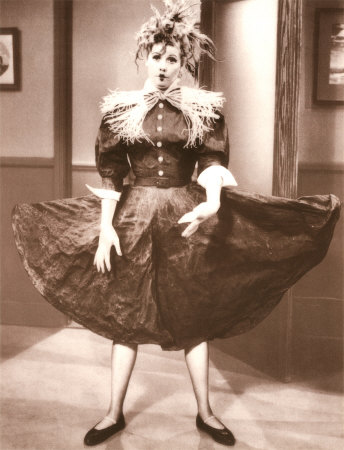This racial history started innocently enough when a still from the 1949 movie
Anna Lucasta was posted to a Facebook thread about character actress Mary Wickes (who co-stars). Philip Yordan, a white playwright and screenwriter (
Johnny Guitar), wrote
Anna Lukaska in 1936. The story of this Anna (a Polish American prostitute seeking redemption from her family) takes important plot points and characterizations from a play about another literary Anna who turned to prostitution some twenty years before:
Anna Christie by Eugene O'Neill. Possibly because of its similarities,
Anna Lukaska never made it to Broadway in the 30s but almost ten years later, it was discovered by Abram Hill, one of the founders of the
American Negro Theatre Company.

Rumored to have hired an out-of-work black dramatist to provide
Negro dialect Philip Yordan is Anna Lucasta's sole author
In 1944, Hill reconceived the play to reflect African American life, renamed it
Anna Lucasta and produced this new version in the basement of the New York Public Library on 135th Street. Its success in Harlem culminated in a quick move to Broadway where
the play ran for over two years; a hugely successful American tour and engagements in Chicago and on London's West End followed. (Perennial Hollywood couple Ruby Dee and Ossie Davis met and fell in love while performing in the tour of
Anna Lucasta.) Despite its sexual themes and an all-black cast, this theatrical success brought attention from Hollywood.

The Mansfield Theater was renamed The Brooks Atkinson
Click the pic to see the 1944 Playbill
Anna Lucasta was booted from studio to studio because
the material was thoroughly and completely unacceptable. Yordan was desperate to see his play on the screen so he blamed Hill for the
smut and cheap hokum and promised to
eliminate these unwholesome elements from the screenplay. He fashioned a screenplay (with help from writer Arthur Laurents) in which the characters were (once again) white Polish Americans and the
smut was implied. It was then that
Anna Lucasta was filmed (via Security Pictures and producer Yordan) with (r-l) Paulette Goddard as Anna, William Bishop as Rudolf, Mary Wickes as Stella, Lisa Golm as Theresa and Broderick Crawford (not pictured) as Frank.

White
Anna Lucasta is banal, stagebound and unrealistic. Goddard (a little
long in the tooth) resembles
Mildred Pierce and one thinks she had hoped for the same career resucitation from this film that Joan Crawford had gotten from the former. Unfortunately, her performance is more camp than credible with facial tics akimbo. Broderick Crawford as the
villian acts every bit the sleazy Harry character soon to be immortalized in
Born Yesterday and Mary Wickes is the perfect foil in an atypical role. Most interesting though was the casting of Dennie Moore as Blanche, Anna's compadre on the streets; I had previously seen Ms. Moore only in her rousing turn as the manicurist in the classic 1939 film
The Women (also with Goddard although the two never appear on screen together). But the 1949 movie was only the first filmed version.
Watch Anna Lucasta with Paulette Goddard

In 1958,
Anna Lucasta was filmed again - this time the racial switch was flipped back to African Americans. Again produced and written by Yordan, the film starred Eartha Kitt, Sammy Davis Jr., Rex Ingram and Claire Leyba. Black
Anna Lucasta is a much more cohesive film despite the many similarities in the text, and the acting is much better so the characters feel more defined. Kitt especially brought tears to my eyes in any number of scenes and looked sensational while doing it. Leyba (in the great role of Blanche this go-round) proves a wonderful actress and screen personality while Davis, playing a cab driver in his first non-musical role, is still given a gratuitous
hallucinatory dance sequence (with costume changes, MTV-style editing and a great Elmer Bernstein score that apes the beatnik jazz of the era).

Although
Anna Lucasta has the reputation of having been inspired by (or
copied structurally and plot-wise from) O'Neill's classic play, lesser known is the fact that
Anna Lucasta inspired a classic play as well. Written by Alice Childress (who played Blanche on Broadway),
Trouble in Mind is about a black actress appearing in an anti-lynching play directed by one white man and written by another. Seen as a dramatization of Childress' experiences in
Anna Lucasta, the play was first produced Off-Broadway in 1955 and Childress became the first African American woman to be honored with an Obie Award when
Trouble In Mind was selected as the Best Original Off-Broadway Production in 1956.

Alice Childress wrote A Hero Ain't Nothin' But A Sandwich
Trouble in Mind has been revived as recently as 2011
Anna Lucasta is still performed but does it, as one reviewer wrote last year, provide
substantial evidence to support the notion that we’re all the same beneath the skin or is it just a broadly written play with little characterization and stereotypes? Although a
(translated) Greek television movie was made in 1977, most recent productions (including this
2012 stage production in Los Angeles) retain the second generation African American cast. But might we see a revival with a white cast and the sexual themes toned down now again? Would that be racist? Or an attempt at capitalism - like the African-American version of
Steel Magnolias? The Jewish Yordan has an Academy Award, and a reputation as a
front during the Hollywood blacklists of the 50s. All of this belies an interesting little peccadillo.
Some quotes and data in this article have been taken from:
- AFI Catalog of Motion Pictures Produced in the Unted States Volume 1
- Within Our Gates: Ethnicity in American Feature Films, 1911-1960
- The Regal Theater and Black Culture by Clovis E Semmes
- Backstory 2: Interviews with Screenwriters of the 1940s and 1950s edited by Patrick McGilligan
- The Merchant Prince of Poverty Row: Harry Cohn of Columbia Pictures













